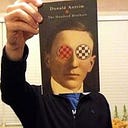The MHS World Cup of Literature: Quarterfinals through to finals
One of the problems sometimes with being a teacher is that you just don’t quite have enough time to do all of the things that you want to do. Then when you do finally get some time (like during the summer holidays), the last thing you want to think about is school and catching up on all of the little things that you never quite got around to finishing off.
During Semester Two of 2018, I held a ‘World Cup of Literature’ tournament with my World Literature students that involved them reading stories from around the world and deciding which one they thought was best. It was a great task that the students really enjoyed and I did too. I wrote a couple of posts about the earlier rounds but then got overwhelmed with everything I had to do and left people hanging when it came to revealing who triumphed at the end of the tournament. Unforgivable! So now here’s the final post to try to redeem myself…
To catch up, here are the earlier posts:
The MHS World Cup of Literature
The MHS World Cup of Literature: The Draw
The MHS World Cup of Literature: Round 1 Results
The MHS World Cup of Literature: Round 2 Results
Once we got past Round Two it all proceeded very quickly. The students all read the remaining eight stories and voted as a class on the match ups for the quarterfinals, semifinals and final.
Quarterfinals
These were the results:
Quarterfinal 1: Peru: ‘Cyber-proletarian’ — Claudia Salazar Jiménez defeated local favourite Australia: ‘Measure Twice, Cut Once’ — Cate Kennedy by 13 goals to 1 in a comprehensive result.
Quarterfinal 2: In another clear victory, Ethiopia: ‘It’s All the Same’ — Bewketu Seyoum defeated Italy: ‘Anyone Can Be Replaced (an excerpt)’ — Peppe Fiore by 13 goals to 2.
Quarterfinal 3: Malaysia: ‘Doppelgänger’ — Dipika Mukherjee triumphed against Montenegro: ‘Leaving’ — Slađana Kavarić by another big score, 13 goals to 1.
Quarterfinal 4: In by far the closest result (there were a number of abstentions), Chile: ‘#Moving’ — María José Navia defeated Iran: ‘The Shipwrecked’ — Moniru Ravanipour by 6 goals to 3.
This meant it was a very strong result for South America, with both Peru and Chile making it to the final four. They would respectively take on Ethiopia and Malaysia, giving a spread across three continents and an apparent endorsement of the spread of great short story writers around the world (at least in the eyes of my students.
Semifinals
Different students made a verbal ‘case’ for voting for the different stories before the rest of the students cast their votes. The semifinals were very closely fought and panned out this way:
Semifinal 1: Ethiopia: ‘It’s All the Same’ — Bewketu Seyoum defeated Peru: ‘Cyber-proletarian’ — Claudia Salazar Jiménez by 9 goals to 7.
Semifinal 2: Malaysia: ‘Doppelgänger’ — Dipika Mukherjee defeated Chile: ‘#Moving’ — María José Navia by another score of 9 goals to 7.
South America may have done well with two teams getting to the semifinals, but neither could make it to the big showdown, the much anticipated final of the MHS World Cup of Literature for 2018. It would be Ethiopia representing African literature and Malaysia representing Asian literature in the final match.
Final
Here’s a brief look at our two finalists:
Dr Dipika Mukherjee, representing Malaysia, is the author of Shambala Junction (Aurora Metro, 2016) Ode to Broken Things (Repeater, 2016) and Rules of Desire (Fixi, 2015), which features her story ‘Doppelgänger’ that has made it to the final. She is also the author of two poetry collections, The Third Glass of Wine (Writer’s Workshop, 2015), and The Palimpsest of Exile (Rubicon Press, 2009) and has edited five anthologies of Southeast Asian fiction. She lives in Chicago and has taught in the United States, India, China, Netherlands, Malaysia and Singapore, so is truly an international traveller and a worthy finalist for consideration by our World Literature students.
Bewketu Seyoum, representing Ethiopia, studied psychology at Addis Ababa University and published his first collection of poems, Nwari Alba Gojowoch (Unmanned Houses), in 2000. In all, he has written four volumes of poetry, two novels, two collections of short fiction, and numerous essays written in his native language, Amharic. His story ‘It’s All the Same’, which has made it to the final, was translated into English by Cheryl Moskowitz and you can read her fascinating essay about travelling to Ethiopia and translating Bewektu’s work, which has also been published in World Literature Today: ‘A Journey to Translation’.
And as for the result, I’m very pleased to (belatedly) announce that the winner of the inaugural MHS World Cup of Literature is Dipika Mukherjee, whose story ‘Doppelgänger’ was judged to be the winner over ‘It’s All the Same’ by Bewketu Seyoum by a score of 10 goals to 5.
I hope people will take the time to read the stories not only of our finalists but all of the participants in this World Cup. The event was intended as a celebration of world literature and an encouragement for all of us to broaden our horizons when it comes to our reading. Literature is a way for us to understand more about the world and can contribute to the breaking down of barriers. If we were to read more literature from other countries and other languages we might be more accepting of people who appear to be different and less inclined to build walls between ourselves and others (whether they be real or metaphorical).
